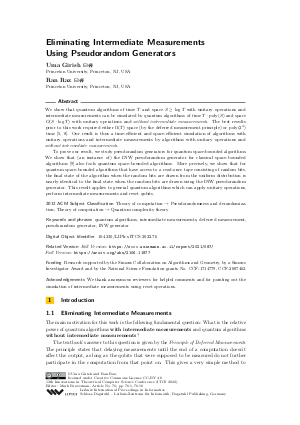Eliminating Intermediate Measurements Using Pseudorandom Generators
Authors Uma Girish, Ran Raz
-
Part of:
Volume:
13th Innovations in Theoretical Computer Science Conference (ITCS 2022)
Part of: Series: Leibniz International Proceedings in Informatics (LIPIcs)
Part of: Conference: Innovations in Theoretical Computer Science Conference (ITCS) - License:
 Creative Commons Attribution 4.0 International license
Creative Commons Attribution 4.0 International license
- Publication Date: 2022-01-25
File

PDF
LIPIcs.ITCS.2022.76.pdf
- Filesize: 0.71 MB
- 18 pages
Document Identifiers
Related Versions
- Full Version https://eccc.weizmann.ac.il/report/2021/087/
- Full Version https://arxiv.org/abs/2106.11877
Subject Classification
ACM Subject Classification
- Theory of computation → Pseudorandomness and derandomization
- Theory of computation → Quantum complexity theory
Keywords
- quantum algorithms
- intermediate measurements
- deferred measurement
- pseudorandom generator
- INW generator
Metrics
- Access Statistics
-
Total Accesses (updated on a weekly basis)
0Document
0Metadata
Abstract
We show that quantum algorithms of time T and space S ≥ log T with unitary operations and intermediate measurements can be simulated by quantum algorithms of time T ⋅ poly (S) and space {O}(S⋅ log T) with unitary operations and without intermediate measurements. The best results prior to this work required either Ω(T) space (by the deferred measurement principle) or poly(2^S) time [Bill Fefferman and Zachary Remscrim, 2021; Uma Girish et al., 2021]. Our result is thus a time-efficient and space-efficient simulation of algorithms with unitary operations and intermediate measurements by algorithms with unitary operations and without intermediate measurements.
To prove our result, we study pseudorandom generators for quantum space-bounded algorithms. We show that (an instance of) the INW pseudorandom generator for classical space-bounded algorithms [Russell Impagliazzo et al., 1994] also fools quantum space-bounded algorithms. More precisely, we show that for quantum space-bounded algorithms that have access to a read-once tape consisting of random bits, the final state of the algorithm when the random bits are drawn from the uniform distribution is nearly identical to the final state when the random bits are drawn using the INW pseudorandom generator. This result applies to general quantum algorithms which can apply unitary operations, perform intermediate measurements and reset qubits.
Cite As Get BibTex
Uma Girish and Ran Raz. Eliminating Intermediate Measurements Using Pseudorandom Generators. In 13th Innovations in Theoretical Computer Science Conference (ITCS 2022). Leibniz International Proceedings in Informatics (LIPIcs), Volume 215, pp. 76:1-76:18, Schloss Dagstuhl – Leibniz-Zentrum für Informatik (2022)
https://doi.org/10.4230/LIPIcs.ITCS.2022.76
BibTex
@InProceedings{girish_et_al:LIPIcs.ITCS.2022.76,
author = {Girish, Uma and Raz, Ran},
title = {{Eliminating Intermediate Measurements Using Pseudorandom Generators}},
booktitle = {13th Innovations in Theoretical Computer Science Conference (ITCS 2022)},
pages = {76:1--76:18},
series = {Leibniz International Proceedings in Informatics (LIPIcs)},
ISBN = {978-3-95977-217-4},
ISSN = {1868-8969},
year = {2022},
volume = {215},
editor = {Braverman, Mark},
publisher = {Schloss Dagstuhl -- Leibniz-Zentrum f{\"u}r Informatik},
address = {Dagstuhl, Germany},
URL = {https://drops.dagstuhl.de/entities/document/10.4230/LIPIcs.ITCS.2022.76},
URN = {urn:nbn:de:0030-drops-156726},
doi = {10.4230/LIPIcs.ITCS.2022.76},
annote = {Keywords: quantum algorithms, intermediate measurements, deferred measurement, pseudorandom generator, INW generator}
}
Author Details
Funding
Research supported by the Simons Collaboration on Algorithms and Geometry, by a Simons Investigator Award and by the National Science Foundation grants No. CCF-1714779, CCF-2007462.
Acknowledgements
We thank anonymous reviewers for helpful comments and for pointing out the simulation of intermediate measurements using reset operations.
References
-
Noga Alon, Oded Goldreich, Johan Håstad, and René Peralta. Simple constructions of almost k-wise independent random variables. In FOCS, 1990.

-
László Babai, Noam Nisan, and Mario Szegedy. Multiparty protocols and logspace-hard pseudorandom sequences (extended abstract). In STOC, 1989.

-
Charles H. Bennett. Time/space trade-offs for reversible computation. SIAM J. Comput., 18(4), 1989.

-
Mark Braverman, Anup Rao, Ran Raz, and Amir Yehudayoff. Pseudorandom generators for regular branching programs. In FOCS, 2010.

-
Bill Fefferman and Zachary Remscrim. Eliminating intermediate measurements in space-bounded quantum computation. In STOC, 2021.

-
Serge Fehr and Christian Schaffner. Randomness extraction via delta -biased masking in the presence of a quantum attacker. In TCC, 2008.

-
Anat Ganor and Ran Raz. Space pseudorandom generators by communication complexity lower bounds. In APPROX/RANDOM, 2014.

-
Uma Girish, Ran Raz, and Wei Zhan. Quantum logspace algorithm for powering matrices with bounded norm. In ICALP, 2021.

-
Russell Impagliazzo, Noam Nisan, and Avi Wigderson. Pseudorandomness for network algorithms. In STOC, 1994.

-
Rolf Landauer. Irreversibility and heat generation in the computing process. IBM J. Res. Dev., 1961.

-
Robert Y. Levine and Alan T. Sherman. A note on bennett’s time-space tradeoff for reversible computation. Technical report, University of Maryland at College Park, USA, 1990.

-
Rudolf Lidl and Harald Niederreiter. Introduction to Finite Fields and their Applications. Cambridge University Press, 2 edition, 1994.

-
Raghu Meka, Omer Reingold, and Avishay Tal. Pseudorandom generators for width-3 branching programs. In STOC, 2019.

-
Joseph Naor and Moni Naor. Small-bias probability spaces: Efficient constructions and applications. In STOC, 1990.

-
Noam Nisan. Psuedorandom generators for space-bounded computation. In STOC, 1990.

-
Noam Nisan and David Zuckerman. Randomness is linear in space. J. Comput. Syst. Sci., 1996.

-
Nicholas Pippenger. On simultaneous resource bounds (preliminary version). In FOCS, 1979.

-
Ran Raz and Omer Reingold. On recycling the randomness of states in space bounded computation. In STOC, 1999.

-
Omer Reingold, Thomas Steinke, and Salil P. Vadhan. Pseudorandomness for regular branching programs via fourier analysis. In APPROX/RANDOM, 2013.

-
Renato Renner. Security of Quantum Key Distribution. PhD thesis, ETH Zurich, September 2005. Available at http://arxiv.org/abs/quant-ph/0512258.

-
Yaoyun Shi. Both toffoli and controlled-not need little help to do universal quantum computing. Quantum Info. Comput., 2003.

-
Joachim von zur Gathen and Jürgen Gerhard. Modern Computer Algebra (3. ed.). Cambridge University Press, 2013.

-
John Watrous. Space-bounded quantum complexity. J. Comput. Syst. Sci., 59, 1999.

-
Andrew Chi-Chih Yao. Quantum circuit complexity. In FOCS, 1993.

